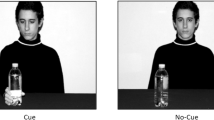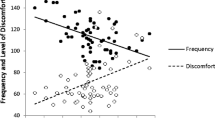Abstract
The present study aimed to examine the links between a self-report measure known to be discriminative of autism (the AQ-10) and performance on the classic unidimensional absolute identification judgment task with 10 line lengths. The interest in this task is due to the fact that discriminating absolutely between such items is quite perceptually challenging and also that it is not very amenable to generalization. Importantly, there are two currently available views of perceptual learning in autism that suggest that those higher on the autism spectrum might have an advantage on this task. Results showed, however, that for N = 291 typically developing individuals, higher scores on the AQ-10 (and also on a measure of the degree to which individuals self-report having a more spontaneous, activist-type learning style) tended to relate to lower levels of accuracy on this task in contrast to what was expected. One explanation furthered for this result was that those with higher AQ-10 scores may have had more difficulties maintaining the overall stimulus context in memory. Such work adds greatly to knowledge of the nature of the individual differences that can affect performance on this particular task.



Similar content being viewed by others
Data availability
The data that support the findings of this study are available at: https://osf.io/ue9xv/?view_only=8dd5f406ef03402387157683b43bfe98.
References
Allison C, Auyeung B, Baron-Cohen S (2012) Towards brief “Red Flags” for autism screening: The short autism spectrum quotient and short quantitative checklist for autism in toddlers in 1,000 cases and 3,000 controls. J Am Acad Child Adolesc Psychiatry 51(2):201–212. https://doi.org/10.1016/j.jaac.2011.11.003
American Psychiatric Association (2013) Diagnostic and statistical manual of mental disorders (DSM-5®). American Psychiatric Publishing, Washington DC. https://doi.org/10.1176/appi.books.9780890425596
Baron-Cohen S, Wheelwright S, Skinner R, Martin J, Clubley E (2001) The autism-spectrum quotient (AQ): evidence from Asperger syndrome/high-functioning autism, males and females, scientists and mathematicians. J Autism Dev Disord 31(1):5–17. https://doi.org/10.1023/a:1005653411471
Beck A-K, Czernochowski D, Lachmann T, Barahona-Correa B, Carmo JC (2022) Is the dolphin a fish? ERP evidence for the impact of typicality during early visual processing in ultra-rapid semantic categorization in autism spectrum disorder. J Neurodev Disord. https://doi.org/10.1186/s11689-022-09457-7
Bölte S, Holtmann M, Poustka F, Scheurich A, Schmidt L (2007) Gestalt perception and local-global processing in high-functioning autism. J Autism Dev Disord 37(8):1493–1504. https://doi.org/10.1007/s10803-006-0231-x
Bonnel A, Mottron L, Peretz I, Trudel M, Gallun E, Bonnel AM (2003) Enhanced pitch sensitivity in individuals with autism: a signal detection analysis. J Cogn Neurosci 15(2):226–235. https://doi.org/10.1162/089892903321208169
Bonnel A, McAdams S, Smith B, Berthiaume C, Bertone A, Ciocca V, Mottron L (2010) Enhanced pure-tone pitch discrimination among persons with autism but not Asperger syndrome. Neuropsychologia 48(9):2465–2475. https://doi.org/10.1016/j.neuropsychologia.2010.04.020
Booth T, Murray AL, McKenzie K, Kuenssberg R, O’Donnell M, Burnett H (2013) Brief report: an evaluation of the AQ-10 a s a brief screening instrument for ASD in adults. J Autism Dev Disord 43:2997–3000. https://doi.org/10.1007/s10803-013-1844-5
Bott L, Brock J, Brockdorff N, Boucher J, Lamberts K (2006) Perceptual similarity in autism. Q J Exp Psychol 59(7):1237–1254. https://doi.org/10.1080/02724980543000196
Brown SD, Marley AAJ, Donkin C, Heathcote A (2008) An integrated model of choices and response times in absolute identification. Psychol Rev 115:396–425. https://doi.org/10.1037/0033-295x.115.2.396
Brugha TS, Spiers N, Bankart J, Cooper SA, McManus S, Scott FJ et al (2016) Epidemiology of autism in adults across age groups and ability levels. Br J Psychiatry 209(6):498–503. https://doi.org/10.1192/bjp.bp.115.174649
Carmo JC, Souza C, Gonçalves F, Pinho S, Filipe CN, Lachmann T (2017) Effects of categorical representation on visuospatial working memory in autism spectrum disorder. J Clin Exp Neuropsychol 39(2):131–141. https://doi.org/10.1080/13803395.2016.1207754
Constantino JN (2011) The quantitative nature of autistic social impairment. Pediatr Res 69:55–62. https://doi.org/10.1203/PDR.0b013e318212ec6e
Desaunay P, Briant AR, Bowler DM, Ring M, Gérardin P, Baleyte J-M, Guénolé F, Eustache F, Parienti J-J, Guillery-Girard B (2020) Memory in autism spectrum disorder: a meta-analysis of experimental studies. Psychol Bull 146(5):377–410. https://doi.org/10.1037/bull0000225
Dodds P, Donkin C, Brown SD, Heathcote A (2011) Increasing capacity: practice effects in absolute identification. J Exp Psychol Learn Mem Cogn 37(2):477–492. https://doi.org/10.1037/a0022215
Donkin C, Rae B, Heathcote A, Brown SD (2015) Why is labelling simple magnitudes so hard? In: Busemeyer JR, Townsend JT, Wang ZJ, Eidels A (eds) Oxford handbook of computational and mathematical psychology. Oxford University Press, Oxford. https://doi.org/10.1093/oxfordhb/9780199957996.013.6
Fugard AJB, Stewart ME, Stenning K (2011) Visual/verbal analytic reasoning bias as a function of self-reported autistic-like traits: a study of typically developing individuals solving ravens advanced progressive matrices. Autism 15(3):327–340. https://doi.org/10.1177/1362361310371798
Gastgeb HZ, Dundas EM, Minshew NJ, Strauss MS (2012) Category formation in autism: can individuals with autism form categories and prototypes of dot patterns. J Autism Dev Disord 42:1694–1704. https://doi.org/10.1007/s10803-011-1411-x
Gökçen E, Petrides KV, Hudry K, Frederickson N, Smillie LD (2014) Sub-threshold autism traits: the role of trait emotional intelligence and cognitive flexibility. Br J Psychol 105(2):187–199. https://doi.org/10.1111/bjop.12033
Heaton P, Davis RE, Happé FG (2008) Research note: exceptional absolute pitch perception for spoken words in an able adult with autism. Neuropsychologia 46(7):2095–2098. https://doi.org/10.1016/j.neuropsychologia.2008.02.006
Hoekstra RA, Bartels M, Cath DC, Boomsma DI (2008) Factor structure, reliability, and criterion validity of the Autism-Spectrum Quotient (AQ): a study in Dutch population and patient groups. J Autism Dev Disord 38:1555–1566. https://doi.org/10.1007/s10803-008-0538-x
Honey P, Mumford A (1992) The manual of learning styles. Peter Honey, Maidenhead
Hu G (1997) Why is it difficult to learn absolute judgment tasks? Percept Motor Skills 84(1):323–335. https://doi.org/10.2466/pms.1997.84.1.323
Jolliffe T, Baron-Cohen S (1997) Are people with autism and Asperger syndrome faster than normal on the Embedded Figures Test? Child Psychol Psychiatry Allied Discip 38(5):527–534. https://doi.org/10.1111/j.1469-7610.1997.tb01539.x
Kent C, Lamberts K (2005) An exemplar account of the bow and set-size effects in absolute identification. J Exp Psychol Learn Memory Cogn 31(2):289–305. https://doi.org/10.1037/0278-7393.31.2.289
Lacouture Y, Marley AAJ (2004) Choice and response time processes in the identification and categorization of unidimensional stimuli. Percept Psychophys 66(7):1206–1226. https://doi.org/10.3758/bf03196847
Landry O, Chouinard PA (2016) Why we should study the broader autism phenotype in typically developing populations. J Cogn Dev 17(4):584–595. https://doi.org/10.1080/15248372.2016.1200046
Loomes R, Hull L, Mandy WPL (2017) What is the male-to-female ratio in autism spectrum disorder? A systematic review and meta-analysis. J Am Acad Child Adolesc Psychiatry 56(6):466–474. https://doi.org/10.1016/j.jaac.2017.03.013
Lowe MX, Stevenson RA, Barense MD, Cant JS, Ferber S (2018) Relating the perception of visual ensemble statistics to individual levels of autistic traits. Atten Percept Psychophys 80:1667–1674. https://doi.org/10.3758/s13414-018-1580-1
Lundin A, Kosidou K, Dalman C (2019) Measuring autism traits in the adult general population with the brief Autism-Spectrum Quotient, AQ-10: finding from the stockholm public health cohort. J Autism Dev Disord 49:773–780. https://doi.org/10.1007/s10803-018-3749-9
Miller GA (1956) The magical number seven, plus or minus two: some limits on our capacity for processing information. Psychol Rev 63(2):81–97. https://doi.org/10.1037/h0043158
O’Riordan MA, Plaisted KC, Driver J, Baron-Cohen S (2001) Superior visual search in autism. J Exp Psychol Hum Percept Perform 27(3):719–730. https://doi.org/10.1037//0096-1523.27.3.719
Parkington KB, Clements RJ, Landry O, Chouinard PA (2015) Visual-motor association learning in undergraduate students as a function of the autism-spectrum quotient. Exp Brain Res 233:2883–2895. https://doi.org/10.1007/s00221-015-4358-x
Petrov AA, Anderson JR (2005) The dynamics of scaling: a memory-based anchor model of category rating and absolute identification. Psychol Rev 112:383–416. https://doi.org/10.1037/0033-295x.112.2.383
Plaisted K (2001) Reduced generalization in autism: an alternative to weak central coherence. In: Burack JA, Charman T, Yirmiya N, Zelazo PR (eds) The development of autism: perspectives from theory and research. Erlbaum, Hillsdale, pp 149–169
Plaisted K, O’Riordan M, Baron-Cohen S (1998a) Enhanced discrimination of novel, highly similar stimuli by adults with autism during a perceptual learning task. J Child Psychol Psychiatry Allied Discip 39(5):765–775. https://doi.org/10.1111/1469-7610.00375
Plaisted K, O’Riordan M, Baron-Cohen S (1998b) Enhanced visual search for a conjunctive target in autism: a research note. J Child Psychol Psychiatry Allied Discip 39(5):777–783. https://doi.org/10.1017/S0021963098002613
Qian N, Lipkin RM (2011) A learning-style theory for understanding autistic behaviors. Front Hum Neurosci 5:77. https://doi.org/10.3389/fnhum.2011.00077
Reed P, Lowe C, Everett R (2011) Perceptual learning and perceptual search are altered in male university students with higher Autism Quotient scores. Personal Individ Differ 51(6):732–736. https://doi.org/10.1016/j.paid.2011.06.016
Richmond LL, Thorpe M, Berryhill ME, Klugman J, Olson IR (2013) Individual differences in autistic trait load in the general population predict working memory performance. Q J Exp Psychol 66(6):1182–1195. https://doi.org/10.1080/17470218.2012.734831
Sapey-Triomphe L-A, Sonié S, Hénaff M-A, Mattout J, Schmitz C (2018) Adults with autism tend to undermine the hidden environmental structure: evidence from a visual associative learning task. J Autism Dev Disord 48(9):3061–3074. https://doi.org/10.1007/s10803-018-3574-1
Shiffrin RM, Nosofsky RM (1994) Seven plus or minus two: a commentary on capacity limitations. Psychol Rev 101(2):357–361. https://doi.org/10.1037/0033-295x.101.2.357
Soulières I, Mottron L, Saumier D, Larochelle S (2007) Atypical categorical perception in autism: autonomy of discrimination? J Autism Dev Disord 37(3):481–490. https://doi.org/10.1007/s10803-006-0172-4
Steegen S, Tuerlinckx F, Gelman A, Vanpaemel W (2016) Increasing transparency through a multiverse analysis. Psychol Sci 11(5):702–712. https://doi.org/10.1177/1745691616658637
Stevenson JL, Hart KR (2017) Psychometric properties of the Autism-Spectrum Quotient for assessing low and high levels of autistic traits in college students. J Autism Dev Disord 47(6):1838–1853. https://doi.org/10.1007/s10803-017-3109-1
Stewart N, Brown GD, Chater N (2005) Absolute identification by relative judgment. Psychol Rev 112(4):881–911. https://doi.org/10.1037/0033-295x.112.4.881
Stewart ME, Griffiths TD, Grube M (2018) Autistic traits and enhanced representation of pitch and time. J Autism Dev Disord 48:1350–1358. https://doi.org/10.1007/s10803-015-2517-3
Taylor EC, Livingstone LA, Clutterbuck RA, Shah P (2020) Psychometric concerns with the 10-item Autism-Spectrum Quotient (AQ10) as a measure of trait autism in the general population. Exp Results 1(e3):1–6. https://doi.org/10.1017/exp.2019.3
Vanpaemel W, Bayer J (2021) Prototype-based category learning in autism: a review. Neurosci Biobehav Rev 127:607–618. https://doi.org/10.1016/j.neubiorev.2021.05.016
Vladusich T, Olu-Lafe O, Kim D-S, Tager-Flusberg H, Grossberg S (2010) Prototypical category learning in high-functioning autism. Autism Res 3:226–236
Wakabayashi A, Baron-Cohen S, Wheelwright S, Goldenfeld N, Delaney J, Fine D et al (2006) Development of short forms of the Empathy Quotient (EQ-Short) and the Systemizing Quotient (SQ-Short). Personal Individ Differ 41(5):929–940. https://doi.org/10.1016/j.paid.2006.03.017
Funding
None of the authors has received any funding for this work.
Author information
Authors and Affiliations
Contributions
All authors contributed to the study conception and design. Material preparation, data collection and analysis were performed by SMMMF and CL-S. The first draft of the manuscript was written by SMMMF and all authors commented on previous versions of the manuscript. All authors read and approved the final manuscript.
Corresponding author
Ethics declarations
Conflict of interest
None of the authors have any personal or financial conflict of interest regarding the work reported in this study.
Ethical approval
Ethics Approval for this study has been provided by the Carleton University Research Ethics Board.
Additional information
Publisher's Note
Springer Nature remains neutral with regard to jurisdictional claims in published maps and institutional affiliations.
Editor: Thomas Lachmann (RPTU Kaiserslautern); Reviewers: Cristiane Souza (ISCTE - University Institute of Lisbon) and a second researcher who prefers to remain anonymous.
Appendix
Appendix
See Table 5.
Rights and permissions
Springer Nature or its licensor (e.g. a society or other partner) holds exclusive rights to this article under a publishing agreement with the author(s) or other rightsholder(s); author self-archiving of the accepted manuscript version of this article is solely governed by the terms of such publishing agreement and applicable law.
About this article
Cite this article
Moshirian Farahi, S.M.M., Leth-Steensen, C. Individual differences in absolute identification as a function of autistic trait levels. Cogn Process 25, 133–145 (2024). https://doi.org/10.1007/s10339-023-01166-w
Received:
Accepted:
Published:
Issue Date:
DOI: https://doi.org/10.1007/s10339-023-01166-w




